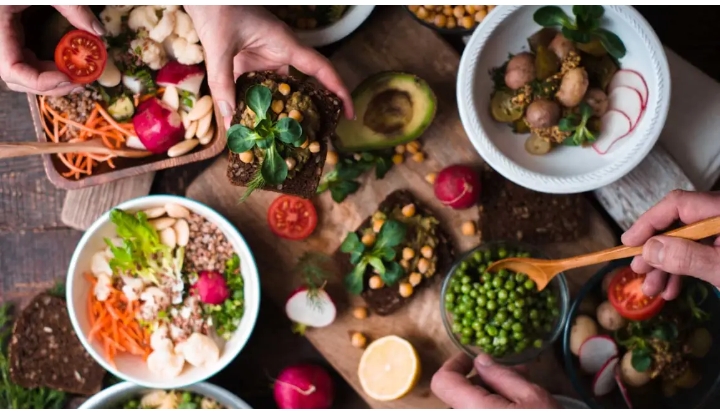
Introduction
Cancer is a complex disease that can be influenced by a variety of factors, including genetics, environmental exposures, and lifestyle habits. One lifestyle habit that has been shown to play a significant role in cancer prevention and recovery is nutrition
The foods we eat provide the building blocks for our bodies, and research has shown that certain nutrients and dietary patterns can help to protect against cancer or improve outcomes for those who have been diagnosed. For example, diets that are high in fruits, vegetables, whole grains, and lean proteins have been linked to a lower risk of several types of cancer, including breast, colorectal, and prostate cancer.
Similarly, for those who have been diagnosed with cancer, eating a healthy diet can be an important part of treatment and recovery. Cancer treatments such as chemotherapy and radiation can cause side effects like nausea, fatigue, and appetite loss, which can make it challenging to eat enough to support the body’s needs. However, a balanced diet that includes plenty of nutrient-rich foods can help to reduce these side effects and promote healing.
While nutrition is just one piece of the cancer prevention and recovery puzzle, it is an important one. By making small, sustainable changes to your diet, you can support your body’s natural defenses against cancer and improve your overall health and well-being.
Foods to Include in Your Diet for Cancer Prevention
When it comes to cancer prevention, there are several types of foods that have been shown to be particularly beneficial. These foods are often rich in nutrients like antioxidants, fiber, and healthy fats, which work together to protect the body against cancer.
One of the most well-known cancer-fighting foods is fruits and vegetables. These foods are packed with vitamins, minerals, and antioxidants, which help to neutralize harmful free radicals in the body and prevent cellular damage that can lead to cancer. Some of the best cancer-fighting fruits and vegetables include:
Berries: Blueberries, strawberries, raspberries, and other berries are rich in antioxidants called polyphenols, which have been shown to reduce inflammation and protect against cancer.
Leafy greens: Spinach, kale, collard greens, and other leafy greens are rich in vitamins and minerals, as well as antioxidants like lutein and zeaxanthin, which have been linked to a lower risk of several types of cancer.
Cruciferous vegetables: Broccoli, cauliflower, Brussels sprouts, and other cruciferous vegetables contain compounds called glucosinolates, which have been shown to have anti-cancer properties.
Tomatoes: Tomatoes are rich in lycopene, an antioxidant that has been linked to a lower risk of several types of cancer, including prostate cancer.
In addition to fruits and vegetables, other cancer-fighting foods include whole grains, lean proteins, and healthy fats. Whole grains like brown rice, quinoa, and whole wheat bread are rich in fiber and other nutrients that can help to reduce inflammation and prevent cancer. Lean proteins like chicken, fish, and tofu provide essential amino acids for building and repairing tissues, while healthy fats like olive oil, nuts, and seeds contain anti-inflammatory compounds that can protect against cancer.
By incorporating these cancer-fighting foods into your diet, you can help to reduce your risk of cancer and support your overall health and well-being.
Foods to Include in Your Diet for Cancer Recovery
Eating a healthy diet is important for everyone, but it is particularly crucial for those who are recovering from cancer. During cancer treatment, the body may be under a great deal of stress, and a balanced diet can help to provide the nutrients needed to support healing and recovery. Here are some foods to include in your diet for cancer recovery:
Protein-rich foods: Protein is essential for building and repairing tissues, and it can be particularly important during cancer recovery. Good sources of protein include lean meats, fish, tofu, beans, and lentils.
High-fiber foods: Fiber can help to promote healthy digestion and reduce the risk of constipation, which can be a common side effect of cancer treatment. Foods like whole grains, fruits, and vegetables are all good sources of fiber.
Nutrient-dense foods: Nutrient-dense foods are those that are high in vitamins, minerals, and other nutrients that the body needs to function properly. Examples include leafy greens, berries, nuts, and seeds.
Healthy fats: Healthy fats, like those found in olive oil, avocados, and fatty fish, can help to reduce inflammation and support brain health.
Hydrating foods: Staying hydrated is important during cancer recovery, and foods with high water content can help to support hydration levels. Examples include watermelon, cucumbers, and leafy greens.
By incorporating these types of foods into your diet, you can help to support your body’s natural healing processes and improve your overall health and well-being during cancer recovery
Foods to Avoid for Cancer Prevention and Recovery
While there are many foods that can be beneficial for cancer prevention and recovery, there are also some foods that are best to avoid or limit. These foods are often high in unhealthy fats, added sugars, and other ingredients that can contribute to inflammation and other health issues. Here are some foods to avoid for cancer prevention and recovery:
Processed and red meats: Processed meats like hot dogs, bacon, and deli meats have been linked to an increased risk of colorectal cancer. Similarly, red meat like beef, pork, and lamb can also increase the risk of cancer.
Sugary drinks and snacks: Foods and drinks that are high in added sugars, like soda, candy, and baked goods, can contribute to inflammation and increase the risk of several types of cancer.
Fried and fatty foods: Fried foods like french fries and fried chicken can be high in unhealthy fats, which can contribute to inflammation and increase the risk of several types of cancer.
Alcohol: Alcohol consumption has been linked to an increased risk of several types of cancer, including breast, liver, and colorectal cancer. If you do choose to drink alcohol, it is recommended to do so in moderation.
Refined grains: Refined grains like white bread, pasta, and rice are often low in fiber and other important nutrients. Instead, choose whole grains like brown rice, quinoa, and whole wheat bread, which are higher in fiber and other nutrients.
By avoiding or limiting these types of foods in your diet, you can help to reduce your risk of cancer and support your overall health and well-being
Tips for Eating a Cancer-Fighting Diet
If you are looking to eat a cancer-fighting diet, there are several tips and strategies that can help you to make the most of your food choices. Here are some tips for eating a cancer-fighting diet:
Eat plenty of fruits and vegetables: Fruits and vegetables are packed with cancer-fighting nutrients like vitamins, minerals, and antioxidants. Aim to include a variety of colors in your diet, as different colors of produce can provide different health benefits.
Choose whole grains: Whole grains like brown rice, quinoa, and whole wheat bread are higher in fiber and other important nutrients than refined grains like white bread and pasta. Fiber can help to promote healthy digestion and reduce the risk of certain types of cancer.
Include lean proteins: Lean proteins like chicken, fish, and tofu can help to support muscle growth and repair, which is important during cancer treatment and recovery.
Limit processed and red meats: Processed meats like hot dogs and deli meats, as well as red meats like beef and pork, have been linked to an increased risk of certain types of cancer. Try to limit your intake of these types of meats.
Choose healthy fats: Healthy fats like those found in olive oil, avocado, and fatty fish can help to reduce inflammation and support brain health. Try to include these types of healthy fats in your diet on a regular basis.
Stay hydrated: Drinking plenty of water and other hydrating fluids can help to support overall health and well-being. Aim to drink at least eight glasses of water per day, and more if you are active or live in a hot climate.
By following these tips and strategies, you can help to create a cancer-fighting diet that supports your overall health and well-being during cancer treatment and recovery
Conclusion
Nutrition plays a vital role in both cancer prevention and recovery. By making smart food choices and including plenty of cancer-fighting foods in your diet, you can help to reduce your risk of cancer and support your overall health and well-being.
In addition, a healthy diet can also help to support recovery from cancer treatment, providing the nutrients and energy your body needs to heal and repair. By eating a well-balanced diet that includes plenty of fruits, vegetables, whole grains, and lean proteins, you can help to promote healthy digestion, reduce inflammation, and support your immune system.
Remember, making small, sustainable changes to your diet is the key to long-term success. Rather than trying to overhaul your entire diet at once, focus on making small changes that you can maintain over time. This might mean swapping out refined grains for whole grains, incorporating more fruits and vegetables into your meals, or limiting your intake of processed and red meats.
By making these small changes, you can create a healthier, more balanced diet that supports your overall health and well-being. Whether you are looking to reduce your risk of cancer or support your recovery from cancer treatment, nutrition is an important piece of the puzzle. Start making small, sustainable changes to your diet today, and enjoy the many benefits that come with a healthy, cancer-fighting.

